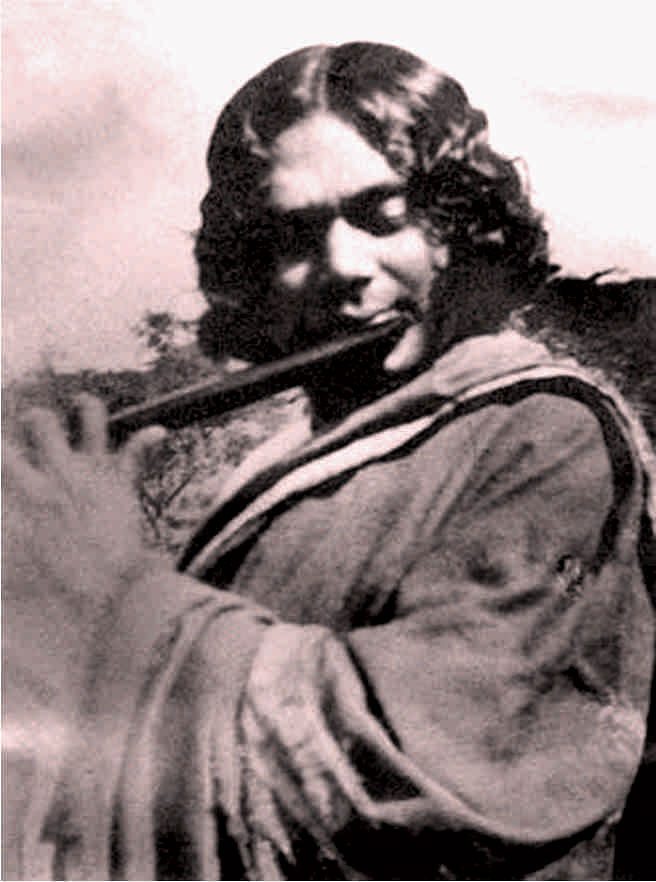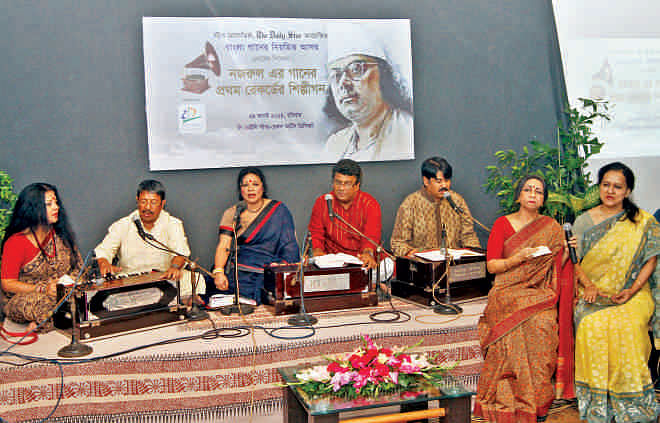Melodies of Nazrul

Rebel Poet Kazi Nazrul Islam was once invited to a meeting to perform some of his songs. It is because of his dreamy nature, Nazrul forgot the songs he had selected to perform. On the podium he wanted a pencil and a paper. Just like receiving magical chants from heaven Nazrul started to write verses of some new songs. Then he took a few minutes to compose and then charmed the crowd with some mind-blowing new songs. It is only one example of his supernatural genius.
Syed Badrul Ahsan, executive editor of the Daily Star shared this story with a crowd of Nazrul artistes, fans and literary enthusiasts who gathered at the Daily Star-Bengal Arts Precinct to pay tribute to this marvel of the world literature. On the occasion of Nazrul's 38th death anniversary, Star Melodies of The Daily Star in association of Shimantik Creative Concern arranged a special tribute called “The Artistes of the First Record of Kazi Nazrul Islam”.
Sadya Afreen Mallick, a renowned Nazrul singer and editor The Daily Star Arts and Entertainment, while moderating the programme says, “We have organised many programmes of Nazrul's songs but through this programme we also remembered the artistes of the first records of Nazrul's classic creations. Without these records Nazrul's music would have been lost forever. So while paying homage to Nazrul, we also remembered those artistes who preserved his creations.”
In this programme, 19 songs of Nazrul's first record were selected to be performed by renowned Nazrul singers like Fatema Tuz Zohra, Khairul Anam Shakil, Nashid Kamal, Shuman Chowdhury, Dalia Nowsheen, Sadya Afreen Mallick and Sujit Mustafa. These songs are the first symbol of the Bengalis' resurgence through music. Fatema Tuz Zohra, a renowned Nazrul singer, says, “The romanticism, philosophy and the inner strength of Nazrul's songs is really exclusive. They are unique. We must preserve and explore this enormous resource of our culture. I am very happy that through this programme I also got the chance to pay my tribute to the artistes who preserved Nazrul's creations.”

The effort that has been made to collate these songs and information about the artistes is epic. As Nazrul was not very concerned about his own creation, most of his songs and other works got scattered after his sudden illness. In the early 1960s an eminent Nazrul researcher, Asadul Huq, collected many of his manuscripts and records to save them from destruction. Brahmamohon Thakur, another Nazrul researcher authored a book called “Nazrul Shangit Nirdeshika” on Nazrul's songs which were published by Nazrul Institute. This book and Asadul Huq's research were the main sources from where we know about the first artistes of Nazrul's recorded songs.
The first song of Nazrul was recorded in 1925 by HMV. The title of the song was “Jater Nam a Bajjat e Shob” which was performed by an occasional singer called Horendranath Dutta. Even Nazrul himself had performed in five or six of his own records. Under his tutelage, artistes like Shachin Dev Burman, Abbasuddin Ahmed, Jogonmoy Mitra started to appear in the budding Bengali entertainment world. Renowned Nazrul singer Nashid Kamal says, “Among Nazrul's many splendid Islamic songs, the song “Khatun e Jannat Fatema Janani” is probably the only Bengali song in honour of Prophet Muhammad's (Peace be upon him) daughter Fatima (Ra). I am really happy to sing this song again which was first sung by my grandfather Abbasuddin Ahmed.”
But in Bangladesh research on Nazrul's enormous creation is inadequate. Little information can be found about his writings, poetry and songs. A renowned Nazrul singer and researcher, Sujit Mustafa says, “With his 3500 songs Nazrul added 15000 new words to the Bengali language. This is an extraordinary contribution. But it is unfortunate that we face many obstacles when we try to explore this great personality.”

Through his songs and writings, Nazrul gave a new life to the movement against colonialism. Prominent cultural activist and journalist Kamal Lohani told the audience, “For his writings Nazrul faced sufferings and torture. No other poet had to embrace imprisonment for his poetry. When Nazrul delivered his statement in front of the British judiciary, the literary value of the statement stunned everyone and even the speech has been recognised as great literature.”
This programme for the first time has shed light on how and by whom Nazrul's creations were preserved. But initiatives of this kind have to be taken on a large scale through more in-depth research, and the government should promote this kind of initiatives for the sake of our cultural nourishment. Nazrul's works must reach out to the entire world as Nazrul was not for a single nation: Nazrul was for the entire humanity.
The writer can be contacted at [email protected]

 For all latest news, follow The Daily Star's Google News channel.
For all latest news, follow The Daily Star's Google News channel. 



Comments